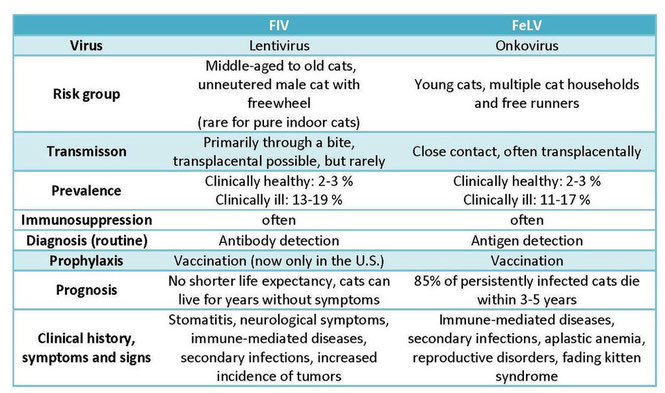FeLV and FIV
Cats

The Feline Leukemia Virus (FeLV) and Feline Immunodeficiency Virus (FIV), also known as cat AIDS, are frequently occurring virus diseases in cats, which damage or destroy the immune system.
Both the Feline Immunodeficiency Virus (FIV) and the Feline Leukemia Virus (FeLV) belong to the class of retroviruses, whereas FeLV belongs to the subfamily of
Oncornaviren and FIV to the subfamily of lentiviruses. FeLV and FIV can cause similar symptoms such as poor coat, continuous fever and loss of appetite. You can distinguish clinical symptoms caused by FIV itself, such as neurological symptoms, and symptoms
due to secondary infections.

The Feline Immunodeficiency Virus (FIV) is spread worldwide. Like nearly all lentiviruses FIV also occurs mainly cell-associated and is only infectious in the outside world for a short period. Transmission takes place by parenteral inoculation of virus-containing cells in the bloodstream of a healthy cat. Nearly 100% transfer probability is given through a bite from an infected cat. It should be noted that antibody formation begins only after two weeks, initially with the appearance of env-specific, then with gag-specific antibodies.
The Feline Leukemia Virus (FeLV) causes the widespread feline leukemia virus infection, which is still one of the leading causes of death in cats. The incubation period varies from animal to animal. In some cats the first symptoms can be seen after a few days of infection, while in other animals it takes weeks, months or years. The retroviruses are transmitted versatile, e.g. through saliva, nasal secretions and urine, hence they represent a high risk of infection to other cats. If the virus infects the bone marrow, the blood formation will get disturbed which leads to anemia and leukemia. The feline leukemia virus (FeLV) is widespread in the feline population and usually fatal, there is a very high risk of infection.
You can vaccinate against the Feline Leukemia Virus, whereas a vaccination against the feline Immunodeficiency Virus is not yet available everywhere. To diagnose an infection of FIV or FeLV solely on the basis of clinical symptoms is very difficult. A mixed infection of FeLV and FIV accelerates the progression of a FIV infection.
Because of similar clinical symptoms in suspected cases, a combined screening test is recommended, such as the Fassisi FeLFIV, which can detect both pathogens individually with only one rapid test device. Especially cats who live in uncontrolled housekeepings with lots of fellow species and cats with free outlet belong to the risk groups. A combined indirect pathogen detection of FIV antibodies together with direct antigen detection (FeLV antigen) can be performed reliably in practice.
Contact
Fassisi, Gesellschaft für Veterinärdiagnostik und Umweltanalysen mbH
Marie-Curie-Strasse 8
37079 Göttingen
Germany
info@fassisi.de
Phone: +49 (0)551 5008840





